Israel vows response after Iran hits it with salvo of ballistic missiles
Sign up now: Get ST's newsletters delivered to your inbox
JERUSALEM/BEIRUT - Iran fired a salvo of ballistic missiles at Israel on Oct 1 in retaliation for Israel’s campaign against Tehran’s Hezbollah allies in Lebanon, drawing vows of a sharp response from both Israel and the United States.
Alarms sounded across Israel and explosions could be heard in Jerusalem and the Jordan River valley.
Israelis piled into bomb shelters and reporters on state television lay flat on the ground during live broadcasts.
Israel said more than 180 missiles were launched into Israel from Iran and Israeli air defences were activated to intercept them.
US Navy warships fired about a dozen interceptors against Iranian missiles headed towards Israel, the Pentagon said.
Iran’s Revolutionary Guard Corps said the assault was in retaliation for recent Israeli killings of militant leaders and aggression in Lebanon and Gaza. Its forces used hypersonic Fattah missiles for the first time, and 90 per cent of its missiles successfully hit their targets in Israel, the Revolutionary Guards said.
No injuries were reported in Israel, but one man was killed in the occupied West Bank, authorities there said.
Washington and the European Union condemned the attack, and the UN Security Council scheduled a meeting on the Middle East for Oct 2.
US President Joe Biden expressed full US support for Israel and described Iran’s attack as “ineffective.” He said there was an active discussion about how Israel would respond, and he would speak with Israeli Prime Minister Benjamin Netanyahu.
Israeli officials promised consequences for the onslaught.
“We will respond wherever, whenever and however we choose, in accordance with the directive of the government of Israel,” Israeli Rear-Admiral Daniel Hagari said.
Washington backed up its longtime ally. “We have made clear that there will be consequences, severe consequences, for this attack, and we will work with Israel to make that the case,” spokesman Jake Sullivan said at a White House briefing.
Mr Sullivan did not specify what those consequences might be, but he stopped short of urging restraint by Israel as the US did in April when Iran carried out a drone and missile attack on Israel.
Israeli Prime Minister Benjamin Netanyahu and a few other ministers were meeting in a bunker near Jerusalem, where the security Cabinet was due to convene shortly, two Israeli officials said.
Iran’s foreign ministry said its operation was defensive and was only directed at Israeli military and security facilities. Earlier, Iran’s state news agency said Tehran targeted three Israeli military bases. Iran urged UN Security Council action.
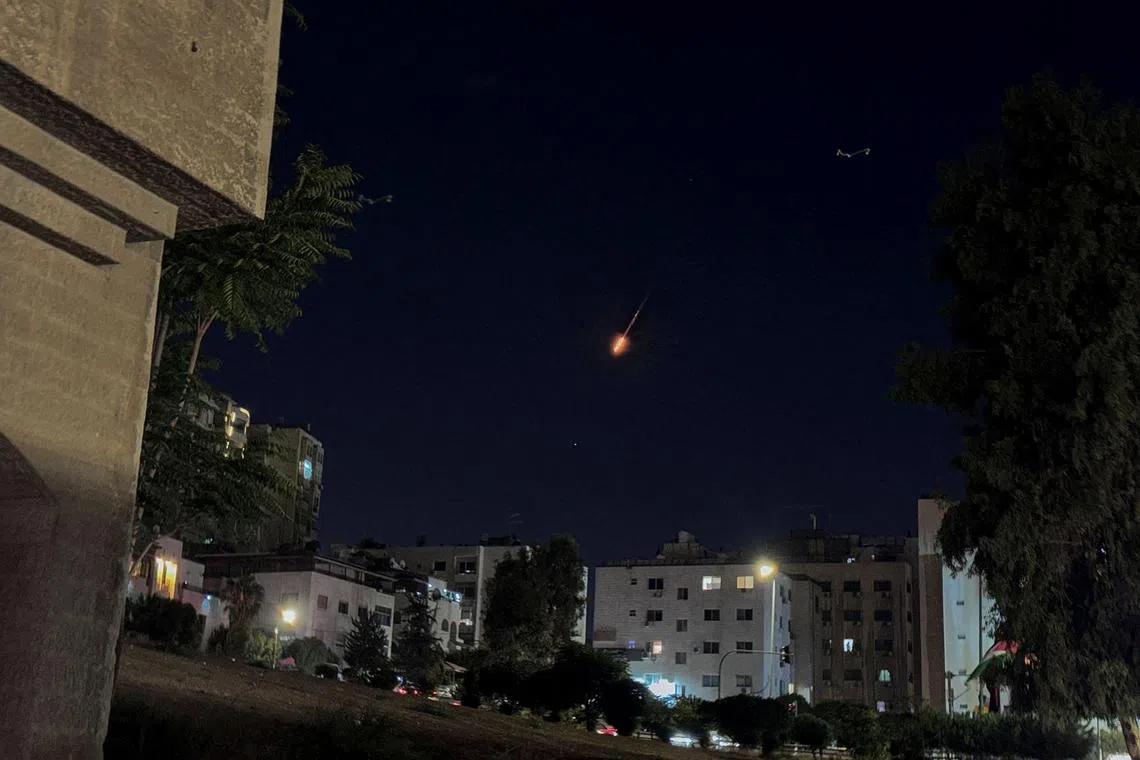
A projectile is seen flying in the sky over Jordan after Iran launched a salvo of ballistic missiles at Israel on Oct 1.
PHOTO: REUTERS
UN Secretary-General Antonio Guterres condemned what he called “escalation after escalation”, saying: “This must stop. We absolutely need a ceasefire.”
Israel in a post on X criticised Mr Guterres for not holding “Iran responsible for firing 181 ballistic missiles at 10 million Israeli civilians.”
EU foreign policy chief Josep Borrell also called for an immediate regional ceasefire. “The dangerous cycle of attacks and retaliation risks... spiralling out of control,” he posted on X.
Iran said if Israel retaliated Tehran’s response would be “more crushing and ruinous”.
Iranian President Masoud Pezeshkian said in a social media post: “This is just part of our capability. Do not get into a confrontation with Iran.”
Oil prices shot up 5 per cent on the news of the Iranian missile strikes, which raise the prospect of a wider war between the two arch enemies.
The previous round of Iranian missiles fired at Israel in April
The Pentagon said the scope of the Oct 1 airstrikes was about twice the size of April’s assault.
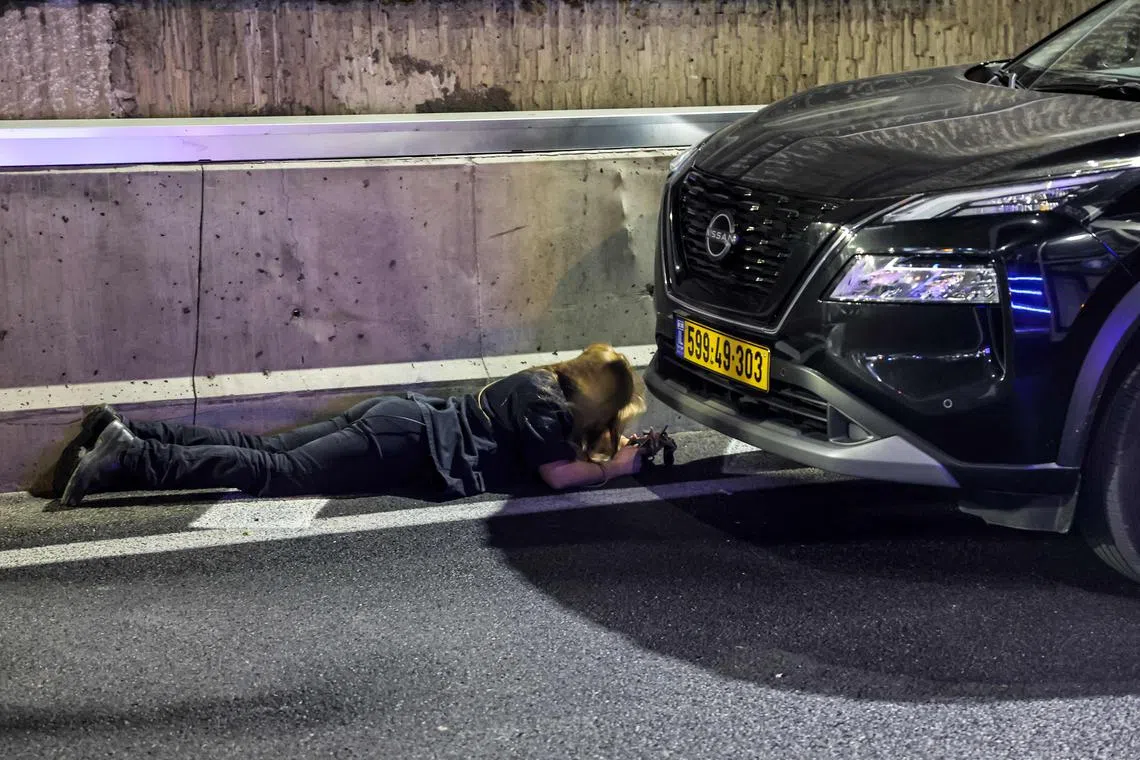
A person taking cover behind a vehicle under a highway bridge, amid the air raid sirens in Tel Aviv, on Oct 1.
PHOTO: AFP
Escalation in Lebanon
Iran had vowed to retaliate following Israeli strikes that killed the top leadership of its ally Hezbollah in Lebanon, including the group’s leader Hassan Nasrallah,
Hamas, the Iran-backed militant group in Gaza, praised the Iranian missile strikes, saying they avenged Israeli assassinations of three militant leaders, including Nasrallah.
More than a thousand Lebanese have been killed and a million have fled their homes in weeks of intense Israeli airstrikes.
In the latest announced killing of a senior Hezbollah figure, Israel said on Oct 1 it had assassinated a commander named Muhammad Jaafar Qasir, describing him as in charge of weapons transfers from Iran and its affiliates.
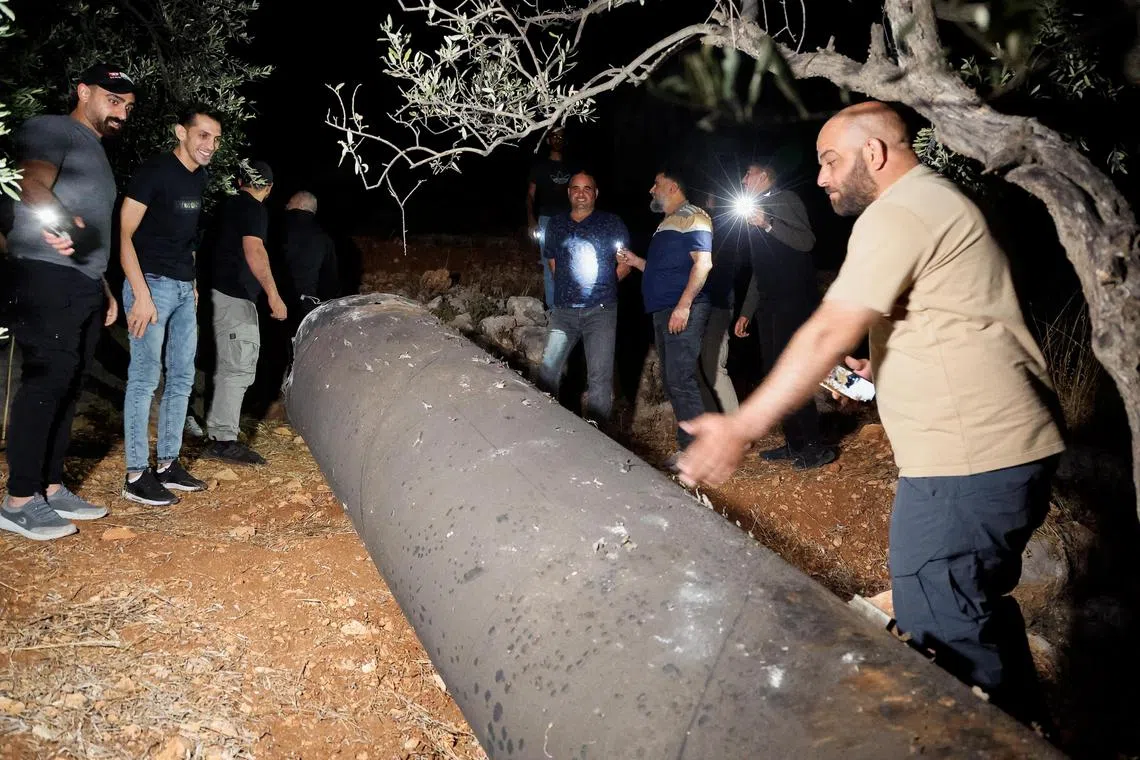
West Bank Palestinians investigating a projectile, after Iran fired a salvo of ballistic missiles at Israel, on Oct 1.
PHOTO: REUTERS
Near the city of Sidon along the Mediterranean south of Beirut, mourners wept over coffins containing black-shrouded bodies of people killed in Israeli strikes.
“The building got struck down and I couldn’t protect my daughter or anyone else. Thank God, my son and I got out, but I lost my daughter and wife, I lost my home, I have become homeless. What do you want me to say? My whole life changed in a second,” said resident Abdulhamid Ramadan.
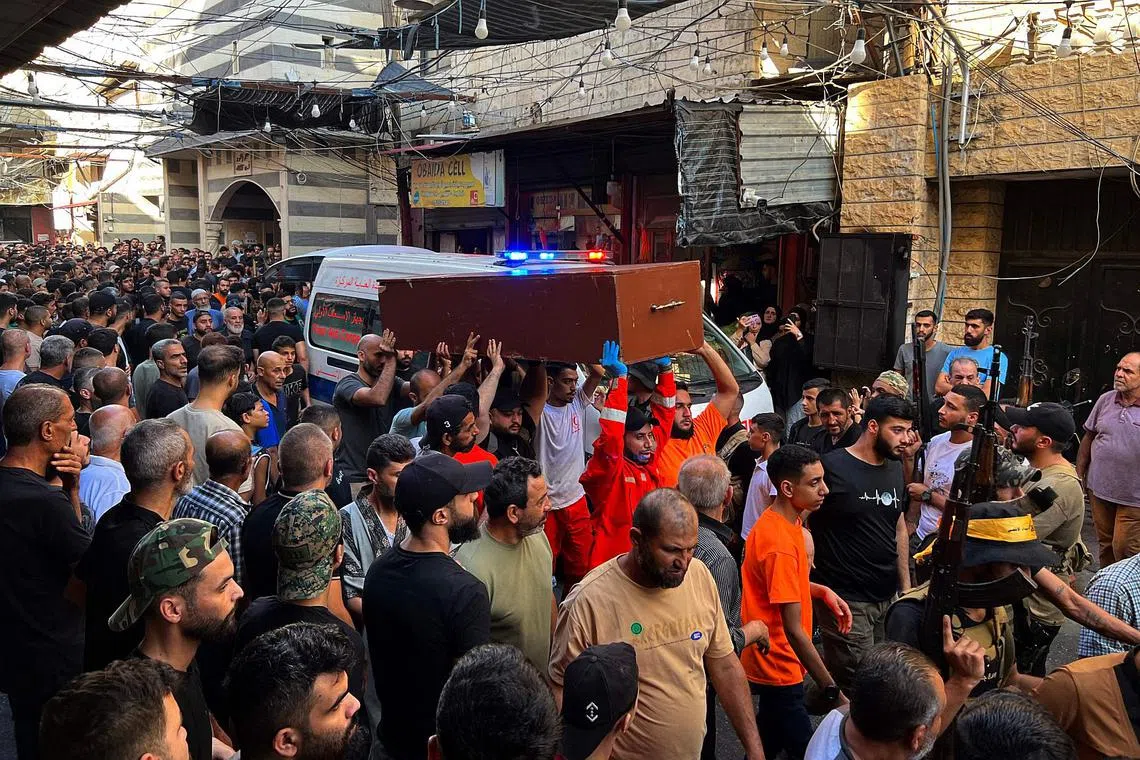
Mourners attending the funeral of three people killed by an Israeli airstrike that targeted the Palestinian refugees camp of Ain al Helwe near the southern Lebanese city of Sidon on Oct 1.
PHOTO: AFP
‘All of Lebanon will fight’
Many Lebanese said they were ready to resist Israeli forces.
“Not just Hezbollah, all of Lebanon will fight this time. All of Lebanon is determined to fight Israel for the massacres it committed in Gaza and Lebanon,” said Mr Abu Alaa, a Sidon resident.
In Beirut, Israel struck a high-rise building in the central Jnah area and one in the capital’s southern suburbs that briefly closed the road to Beirut airport. The Israeli military said it had carried out a “precise strike”.
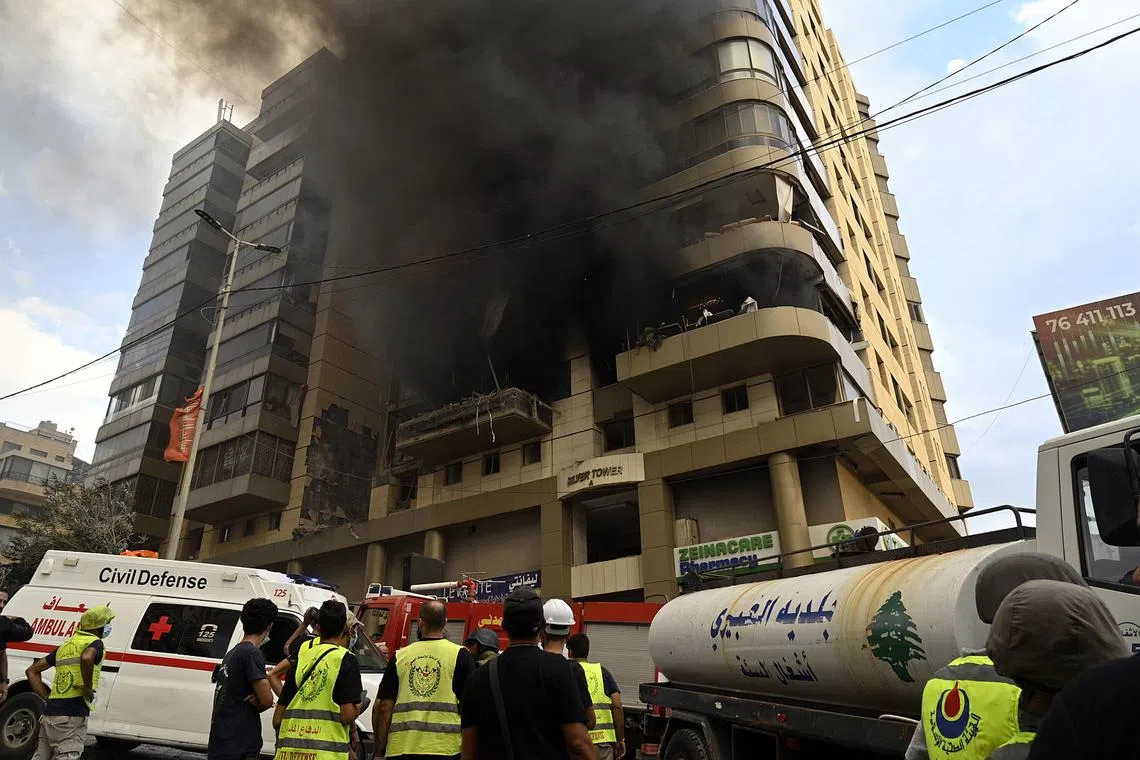
Smoke rising from a building following an Israeli military strike, in the southern suburbs of Beirut, Lebanon, on Oct 1.
PHOTO: EPA-EFE
Israel has long said it would do whatever it takes to secure its northern border and let tens of thousands of Israelis return to towns they fled since the outbreak of war in Gaza a year ago, when Hezbollah began firing across the frontier in solidarity with Palestinians in Gaza.
An Israeli security official said troops in southern Lebanon had begun limited raids into Lebanon
But in a clear sign that the war could expand further, the military said it was calling up four additional reserve brigades for operational missions on the northern border.
Israel has a history of fighting in Lebanon, which it invaded in 1982 in the midst of Lebanon’s own sectarian civil war. Israeli troops finally pulled out in 2000 but returned to fight another major war against Hezbollah in 2006. Since then, the border “blue line” has been monitored by the UN.
The United Nations said its peacekeepers had seen sporadic Israeli incursions but had not seen a full-scale invasion.
Hezbollah, a Shi’ite militia formed by Iran to resist Israeli forces in Lebanon, has evolved into Lebanon’s most powerful armed force, equipped with an arsenal of missiles and rockets. It is also Lebanon’s strongest political party, and sits at the forefront of a network of Iranian-backed armed movements across the Middle East. REUTERS


